-
ORIGINAL ARTICLE12-04-2023
Sepsis and COVID-19: outcomes in young adults in intensive care
Revista Brasileira de Enfermagem. 2023;76(6):e20230037
Abstract
ORIGINAL ARTICLESepsis and COVID-19: outcomes in young adults in intensive care
Revista Brasileira de Enfermagem. 2023;76(6):e20230037
DOI 10.1590/0034-7167-2023-0037
Views0See moreABSTRACT
Objective:
to verify sepsis incidence among young adults admitted to intensive care due to COVID-19 and to analyze its association with demographic, clinical and outcome variables.
Methods:
a quantitative, longitudinal, retrospective and analytical study, consisting of 58 adults aged 20 to 40 years in intensive care for SARS-CoV-2. It was carried out in a university hospital, from March 2020 to December 2021, with data collected from electronic medical records.
Results:
sepsis incidence was 65%. Sepsis was associated with acute kidney injury, use of vasoactive drugs and mechanical ventilation, being admitted to the emergency room, severity according to the Simplified Acute Physiology Score III and bacterial pulmonary co-infection, the latter being the most frequent etiology for sepsis.
Conclusions:
there was a high sepsis incidence, with 42% of deaths, which points to the importance of investing in preventive measures, especially in relation to bacterial pulmonary coinfections.
-
ORIGINAL ARTICLE12-04-2023
Clinical simulation scenarios for the planning and management of infusion therapy by nurses
Revista Brasileira de Enfermagem. 2023;76(6):e20230019
Abstract
ORIGINAL ARTICLEClinical simulation scenarios for the planning and management of infusion therapy by nurses
Revista Brasileira de Enfermagem. 2023;76(6):e20230019
DOI 10.1590/0034-7167-2023-0019
Views0See moreABSTRACT
Objective:
to build, evaluate and test two clinical simulation scenarios for the planning and management of infusion therapy by nurses.
Methods:
methodological study, with construction of scenarios based on the NLN Jeffries Simulation Theory and the theoretical model Vessel Health Preservation; evaluation of the scenario design by judges, with calculation of the Modified Kappa Coefficient (MKC); testing scenarios with the target audience. Results: scenarios built for: 1. Patient assessment and vascular device selection; and 2. Identification and management of deep vein thrombosis. In the evaluation by judges, testing of validated scenarios in relation to educational practices and simulation design, the items evaluated presented MKC values ≥ 0.74.
Conclusion:
two evidence-based scenarios related to infusion therapy were constructed, with high levels of agreement among judges regarding their design. In testing with nurses, good results were obtained regarding the design and structuring of educational practice.
-
12-04-2023
Sleep quality of nurses who worked in coping with COVID-19: an integrative review
Revista Brasileira de Enfermagem. 2023;76(6):e20230007
Abstract
Sleep quality of nurses who worked in coping with COVID-19: an integrative review
Revista Brasileira de Enfermagem. 2023;76(6):e20230007
DOI 10.1590/0034-7167-2023-0007
Views0See moreABSTRACT
Objective:
to analyze sleep quality of nurses who worked coping with COVID-19 in scientific evidence.
Methods:
an integrative review, carried out in seven databases, including studies between December 2021 and June 2022, without language restrictions. The sample consisted of 15 primary studies.
Results:
nurses working in hospital, intensive care, outpatient care and teaching institutions constitute a vulnerable group for sleep disorders: latency, duration, efficiency and quality. The disorders identified involved insomnia at varying levels of severity: daytime dysfunction and morning sleepiness. Night work and low capacity for self-care were determinants of impaired sleep patterns.
Final considerations:
the COVID-19 pandemic contributed to greater vulnerability of nurses to changes in sleep, requiring strategies for risk management and well-being promotion.

-
ORIGINAL ARTICLE12-04-2023
Work and Mental Distress among Nurses in the Amazon Region of Brazil during the COVID-19 Pandemic
Revista Brasileira de Enfermagem. 2023;76(6):e20220792
Abstract
ORIGINAL ARTICLEWork and Mental Distress among Nurses in the Amazon Region of Brazil during the COVID-19 Pandemic
Revista Brasileira de Enfermagem. 2023;76(6):e20220792
DOI 10.1590/0034-7167-2022-0792
Views0See moreABSTRACT
Objective:
To assess the relationship between psychopathological symptoms and the social, clinical, and occupational profile of nurses in the Amazon region of Brazil during the COVID-19 pandemic.
Methods:
A descriptive cross-sectional online study was conducted in 2020 with 261 nurses. The Symptom Assessment Scale-40 was utilized.
Results:
The presence of pre-existing conditions before the pandemic was associated with psychotism (p=0.044). Experiencing constraints and/or violence at work during the pandemic was associated with somatization (p=0.025), and working hours were associated with anxiety (p=0.025). Nurses predominantly exhibited symptoms related to fear (33.7%), tension (34.5%), and a sense that something is wrong in the mind (22.6%).
Conclusions:
A significant association was observed between working hours and anxiety symptoms, the experience of constraints and/or violence at work during the COVID-19 pandemic and somatization symptoms, as well as between pre-existing conditions and psychotism symptoms related to COVID-19.
-
ORIGINAL ARTICLE12-04-2023
Social representation of spiritual surgeries in Umbanda: culture, religion and contributions of nursing theory
Revista Brasileira de Enfermagem. 2023;76(6):e20220787
Abstract
ORIGINAL ARTICLESocial representation of spiritual surgeries in Umbanda: culture, religion and contributions of nursing theory
Revista Brasileira de Enfermagem. 2023;76(6):e20220787
DOI 10.1590/0034-7167-2022-0787
Views0See moreABSTRACT
Objective:
to analyze the social representation of spiritual surgeries in Umbanda for Bantu-Amerindian ritual mediums and their contributions to the cross-cultural care proposed by Madeleine Leininger.
Methods:
a descriptive-exploratory, qualitative study, supported by the procedural approach of Social Representation Theory and Transcultural Nursing Theory, carried out with 30 Umbanda mediums of the Bantu-Amerindian ritual through interviews, submitted to the Iramuteq software for lexical analysis.
Results:
mostly women, white, with an average of 46 years old and approximately 14 years of practice in Umbanda participated. The social representation of spiritual surgeries in Umbanda is objectified and anchored through a biomedical vision of care, encompassing a set of beliefs, values and practices as religious treatments, through faith, whose main objective is healing.
Final considerations:
spiritual surgeries are a form of transcultural care, according to Madeleine Leininger’s propositions, as they integrate the culture of a group through health care in Umbanda.

-
ORIGINAL ARTICLE12-04-2023
Sexual behavior according to undergraduate students: perspective of cross-cultural nursing and intersectional framing
Revista Brasileira de Enfermagem. 2023;76(6):e20220786
Abstract
ORIGINAL ARTICLESexual behavior according to undergraduate students: perspective of cross-cultural nursing and intersectional framing
Revista Brasileira de Enfermagem. 2023;76(6):e20220786
DOI 10.1590/0034-7167-2022-0786
Views0See moreABSTRACT
Objective:
to discuss undergraduate students’ sexual behavior from the perspective of social markers and cross-cultural care proposed by Madeleine Leininger.
Methods:
descriptive-exploratory qualitative research, with a theoretical-philosophical foundation in the Transcultural Theory. Convenience sample was composed of 57 young people from two universities in Rio de Janeiro. The focus groups’ content were analyzed lexically using the IRAMUTEQ software.
Results:
four classes emerged: Young people’s sexual scripts: between the fear of an unplanned pregnancy and the risk of exposure to sexually transmitted infections; Affective relationships: trust in steady sexual partners, apparent sense of security and disuse of condoms; Sexual practices, gender and cultural determinants: distinction in men’s and women’s role; Sexual partnerships, negotiation of condom use and vulnerability to sexually transmitted infections.
Final considerations:
challenges are perceived for the attention to undergraduate students’ sexual health, who verbalized risky sexual behaviors due to sociocultural vulnerabilities.

-
ORIGINAL ARTICLE12-04-2023
Hospital discharge planning in care transition of patients with chronic noncommunicable diseases
Revista Brasileira de Enfermagem. 2023;76(6):e20220772
Abstract
ORIGINAL ARTICLEHospital discharge planning in care transition of patients with chronic noncommunicable diseases
Revista Brasileira de Enfermagem. 2023;76(6):e20220772
DOI 10.1590/0034-7167-2022-0772
Views0See moreABSTRACT
Objective:
to analyze care transition in hospital discharge planning for patients with chronic noncommunicable diseases.
Method:
a qualitative study, based on the Care Transitions Intervention theoretical model, with four pillars of intervention, to ensure a safe transition. Twelve professionals participated in a public hospital in the countryside of São Paulo. Data were collected through observation, document analysis and semi-structured interviews.
Results:
there was a commitment of a multidisciplinary team to comprehensive care and involvement of family members in patient care. The documents facilitated communication between professionals and/or levels of care. However, the lack of time to prepare for discharge can lead to fragmented care, impairing communication and jeopardizing a safe transition.
Final considerations:
they were shown to be important elements in discharge planning composition, aiming to ensure a safe care transition, team participation with nurses as main actors, early discharge planning and family involvement.
-
ORIGINAL ARTICLE12-04-2023
Psychometric Properties of an Instrument for Assessing University Administrators’ Knowledge on Gender-Based Violence
Revista Brasileira de Enfermagem. 2023;76(6):e20220770
Abstract
ORIGINAL ARTICLEPsychometric Properties of an Instrument for Assessing University Administrators’ Knowledge on Gender-Based Violence
Revista Brasileira de Enfermagem. 2023;76(6):e20220770
DOI 10.1590/0034-7167-2022-0770
Views0See moreABSTRACT
Objective:
To evaluate the factorial structure of the instrument measuring university administrators’ knowledge of gender-based violence.
Methods:
This cross-sectional methodological study was conducted from August to November 2020 with 101 university administrators. Data on demographic and functional characteristics were collected, and the “QUEST VBG UNIV” instrument was applied. Descriptive analysis was performed, the structure of the questionnaire was assessed using exploratory factor analysis (EFA), and the stability of the factors was verified through ORION and FDI tests.
Results:
Of the original 38 items across the 4 sections of the questionnaire, 19 were retained within 2 factors, with appropriate factor loadings. Factor 1 had an explained variance of 15.69%, and Factor 2 had an explained variance of 9.10%. The reliability was deemed satisfactory (ORION > 0.900, FDI > 0.900).
Conclusions:
The questionnaire presented a valid and reliable factorial structure for measuring knowledge about gender-based violence, thereby representing a suitable option for situational assessments in universities.

-
REVIEW05-13-2024
Technologies used in the treatment of burn victims in intensive care: a scope review
Revista Brasileira de Enfermagem. 2024;77(1):e20220738
Abstract
REVIEWTechnologies used in the treatment of burn victims in intensive care: a scope review
Revista Brasileira de Enfermagem. 2024;77(1):e20220738
DOI 10.1590/0034-7167-2022-0738
Views0See moreABSTRACT
Objectives:
to analyze the technologies used by the nursing team in the treatment of skin lesions caused by burns in patients under intensive care.
Methods:
this is a scope review conducted on the LILACS, Medline, PubMed, and CINAHL databases without temporal or language restrictions.
Results:
the highlighted technologies included the use of specialized dressings, biological agents such as probiotics and cyanobacteria, as well as negative pressure therapies and enzymes such as papain and collagenase. Some technologies, such as nanocrystalline silver, demonstrated efficacy in infection control.
Final Considerations:
the study identified essential technologies in burn care, emphasizing the need for further research on “soft” technologies. The findings support the promotion of evidence-based nursing care for burn patients in intensive care and enhance knowledge about effective treatments.
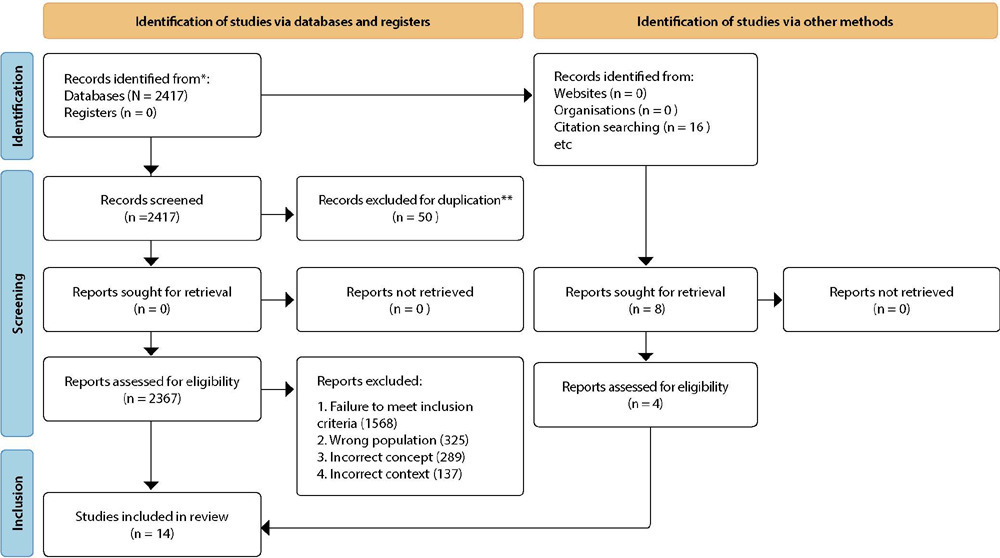
-
ORIGINAL ARTICLE05-03-2024
Cancer patient satisfaction regarding the quality of information received: psychometric validity of EORTC QLQ-INFO25
Revista Brasileira de Enfermagem. 2024;77(1):e20230358
Abstract
ORIGINAL ARTICLECancer patient satisfaction regarding the quality of information received: psychometric validity of EORTC QLQ-INFO25
Revista Brasileira de Enfermagem. 2024;77(1):e20230358
DOI 10.1590/0034-7167-2023-0358
Views0See moreABSTRACT
Objectives:
to psychometrically validate the European Organization for Research and Treatment of Cancer Core Quality of Life Questionnaire EORTC QLQ-INFO25 instrument and identify the domains that influence patients’ perception of the information received.
Methods:
a cross-sectional methodology with cancer patients in a Brazilian philanthropic hospital institution. Sociodemographic and clinical instruments, EORTC QLQ-C30, EORTC QLQ-INFO25 and Supportive Care Needs Survey – Short Form 34 were used. Analysis occurred using Cronbach’s alpha coefficients, intraclass correlation, test-retest and exploratory factor analysis.
Results:
128 respondents participated. Cronbach’s alpha coefficient was 0.85. The test-retest obtained p-value=0.21. In the factor analysis, one item was excluded. Satisfaction with the information received was 74%, with three areas with averages below 70%. In open-ended questions, there was a greater desire for information.
Conclusions:
validity evidence was obtained with instrument reliability, consistency and stability. Respondents expressed satisfaction with the information received.
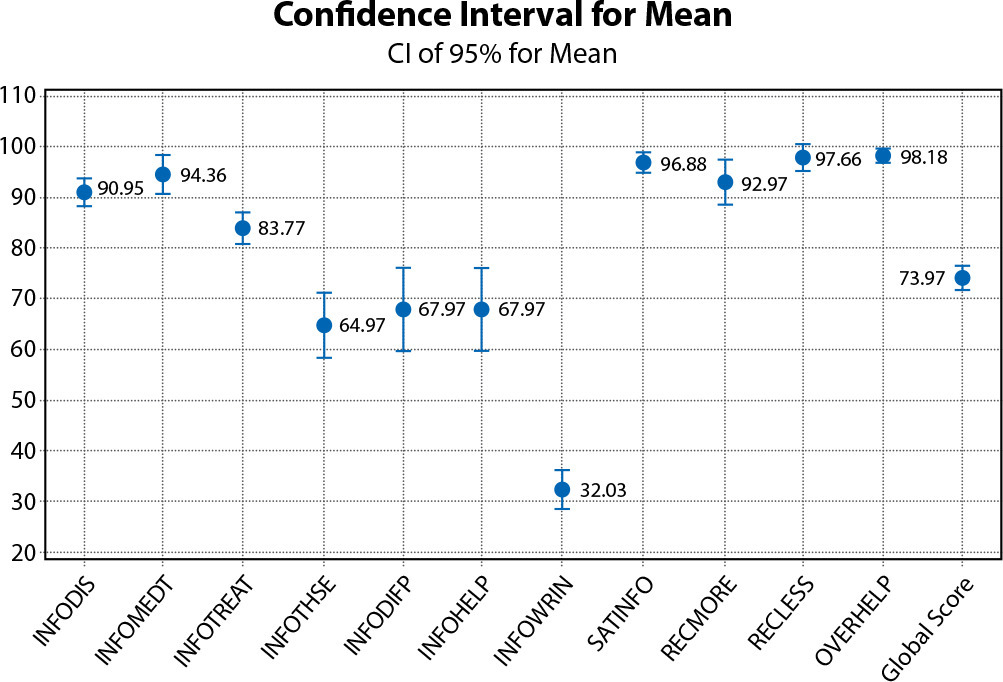
-
05-03-2024
Intervenções de Enfermagem para capacitar o cuidador familiar de uma pessoa com amputação de membro inferior: revisão de escopo
Revista Brasileira de Enfermagem. 2024;77(1):e20230264
Abstract
Intervenções de Enfermagem para capacitar o cuidador familiar de uma pessoa com amputação de membro inferior: revisão de escopo
Revista Brasileira de Enfermagem. 2024;77(1):e20230264
DOI 10.1590/0034-7167-2023-0264
Views0See moreRESUMEN
Objetivos:
mapear intervenciones de enfermería que capaciten al cuidador familiar de la persona con amputación de miembro inferior para su rol.
Métodos:
es una revisión de alcance guiada por la metodología del Instituto Joanna Briggs, llevada a cabo en diferentes bases de datos (incluyendo literatura gris).
Resultados:
se tuvieron en cuenta seis estudios publicados entre 2009 y 2021, a saber: intervenciones de asesoramiento y apoyo para pacientes y familiares; intervenciones de apoyo entre iguales realizadas por un par de profesionales certificados; participación de cuidadores o familiares en grupos de apoyo e intervenciones clave para el equilibrio psicológico del paciente y del cuidador familiar. Dos estudios analizaron la importancia de la formación del cuidador y del amputado y del desarrollo de habilidades de afrontamiento. Otro estudio recomendó intervenciones de apoyo informativo para los cuidadores en relación con el cuidado del amputado y su adaptación a la vida hogareña.
Conclusiones:
los resultados de esta revisión permiten identificar recomendaciones/directrices para la práctica y recomendaciones/sugerencias de intervenciones según las necesidades identificadas de los cuidadores familiares de pacientes con amputación de miembros inferiores.
-
REVIEW05-03-2024
Nursing interventions to empower the family caregiver of person with lower limb amputation: scoping review
Revista Brasileira de Enfermagem. 2024;77(1):e20230264
Abstract
REVIEWNursing interventions to empower the family caregiver of person with lower limb amputation: scoping review
Revista Brasileira de Enfermagem. 2024;77(1):e20230264
DOI 10.1590/0034-7167-2023-0264
Views0See moreABSTRACT
Objectives:
to map nursing interventions that empower the Family caregiver of the person with lower limb amputation for is role.
Methods:
scoping review guided by Joanna Briggs Institute methodology conducted in different databases (including gray literature).
Results:
six studies published between 2009 and 2021 were included. Interventions of counselling and support for patients and family; peer support interventions performed by a certified pair; involvement of caregivers or family members in support groups; and key interventions for patient and family caregiver psychological balance. Two studies discussed the importance of caregiver and amputee training and development of coping skills. Another study recommended Interventions of informative support for caregivers regarding care for the amputee and adaptation to home.
Conclusions:
results of this review allow the identification of recommendations (guidelines) for practice and recommendations/suggestions for interventions according with identified needs of family caregivers of patients with lower limb amputation.
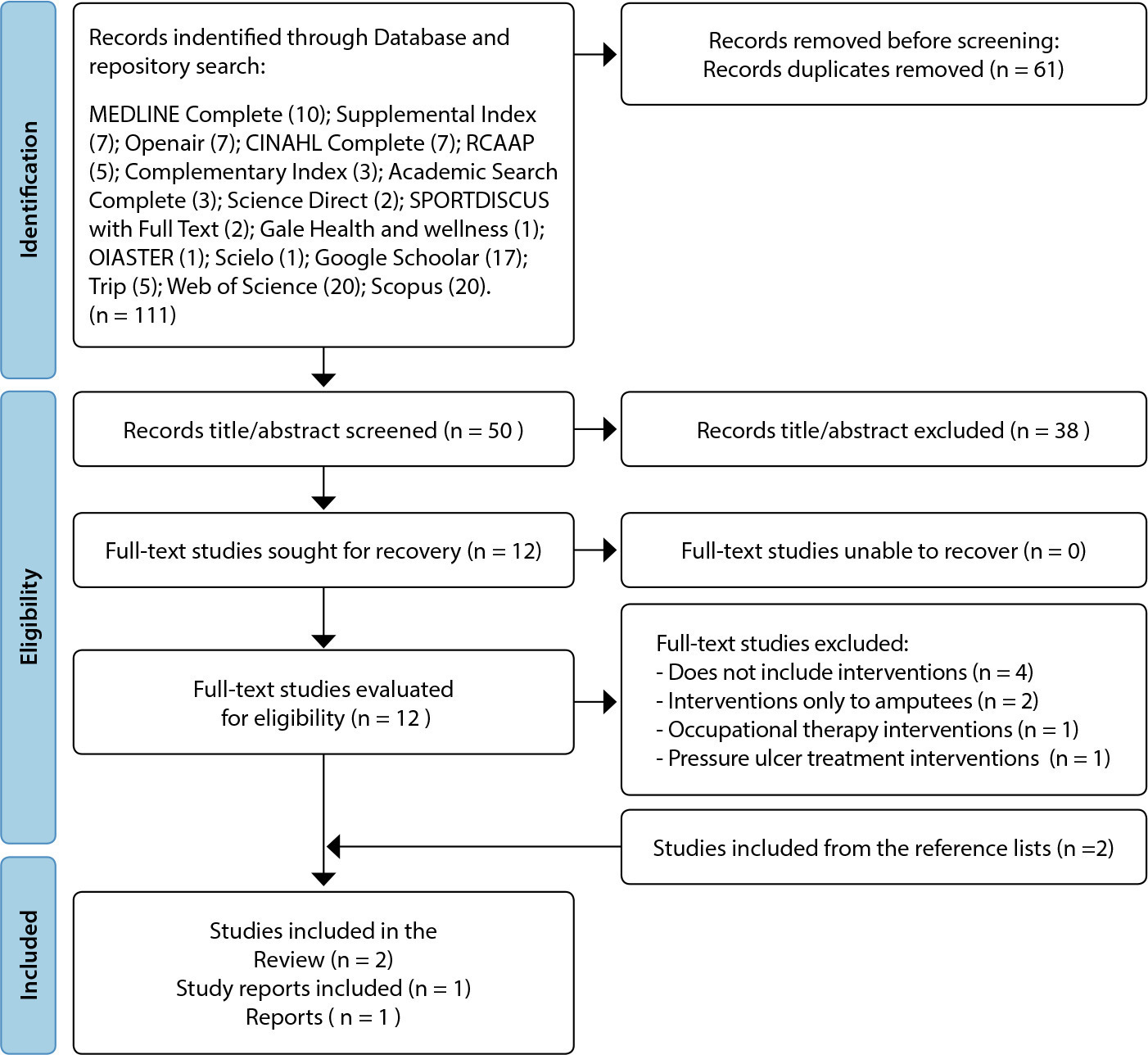
-
ORIGINAL ARTICLE05-03-2024
Pregnancy loss in women with systemic lupus erythematosus: Grounded Theory
Revista Brasileira de Enfermagem. 2024;77(1):e20230225
Abstract
ORIGINAL ARTICLEPregnancy loss in women with systemic lupus erythematosus: Grounded Theory
Revista Brasileira de Enfermagem. 2024;77(1):e20230225
DOI 10.1590/0034-7167-2023-0225
Views0See moreABSTRACT
Objective:
to learn the meanings attributed to pregnancy loss by women with Lupus.
Method:
qualitative research, based on Symbolic Interactionism and Grounded Theory. Data collection took place between January and August 2022 through in-depth interviews. Data analysis went through the stages of initial and focused coding.
Results:
seventeen women participated. The central phenomenon “The climb to motherhood: falls and overcoming” was constructed, consisting of three categories: “Falling to the ground during the climb: the experience of pregnancy loss”; “Getting up and following the path: new attempts to conceive”; and “Remembering the journey: meanings attributed to pregnancy losses”.
Final considerations:
experiencing pregnancy is, analogously, like climbing a mountain, where obstacles need to be overcome to reach the summit. The experience of pregnancy loss is seen as complex, especially when there is fragility in healthcare and a lack of awareness regarding feelings of loss and grief.
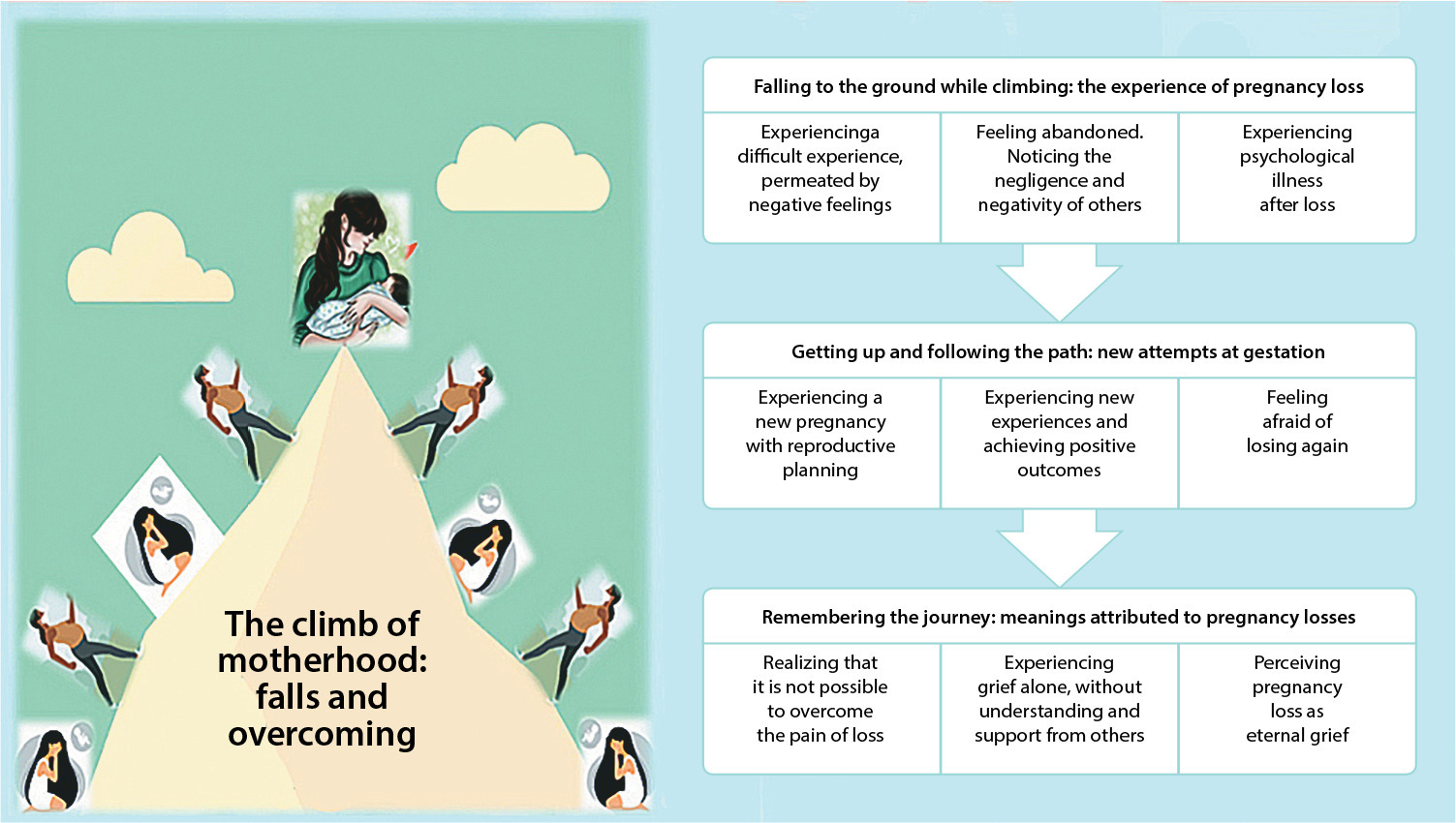
-
ORIGINAL ARTICLE05-03-2024
Josicélia Dumêt Fernandes’ professional trajectory: contributions to psychiatric and mental health nursing
Revista Brasileira de Enfermagem. 2024;77(1):e20230174
Abstract
ORIGINAL ARTICLEJosicélia Dumêt Fernandes’ professional trajectory: contributions to psychiatric and mental health nursing
Revista Brasileira de Enfermagem. 2024;77(1):e20230174
DOI 10.1590/0034-7167-2023-0174
Views0See moreABSTRACT
Objectives:
to analyze nurse Josicélia Dumêt Fernandes’ life story, with emphasis on her work in the psychiatry and mental health fields.
Methods:
historical, qualitative research. Semi-structured interviews and documentary research were used as data collection techniques, collected from September to October 2021. For data analysis, we opted for the content analysis method and comparison with the Foucauldian philosophical framework.
Results:
four categories emerged: Transforming herself and mental health practices; (Re)framing professional practice; Nursing practice and power relations; and The paths and implications in the psychiatry and mental health fields.
Final Considerations:
the study of the biographer demonstrates a search for transformation of herself and mental health practices, with a rupture in paradigms and reframing of her practice in psychiatry and mental health.
-
05-03-2024
Propiedades psicométricas de la versión chilena del cuestionario de calidad de vida para mieloma múltiple
Revista Brasileira de Enfermagem. 2024;77(1):e20230100
Abstract
Propiedades psicométricas de la versión chilena del cuestionario de calidad de vida para mieloma múltiple
Revista Brasileira de Enfermagem. 2024;77(1):e20230100
DOI 10.1590/0034-7167-2023-0100es
Views0See moreRESUMEN
Objetivos:
Evaluar consistencia interna y validez de constructo del QLQ-MY20 para valoración de calidad de vida en sobrevivientes de mieloma múltiple en Chile.
Métodos:
Estudio transversal, realizado entre marzo 2020 y diciembre 2022. Participaron 118 personas de dos hospitales públicos. Se utilizaron los cuestionarios QLQ-C30 y QLQ-MY20. Fueron evaluadas la consistencia interna con alfa de Cronbach (α) y validez de constructo mediante pruebas de hipótesis (Mann Whitney y correlación de Spearman).
Resultados:
El promedio de edad de los participantes era 67,2 (DE=9,2) años. Consistencia interna para escala completa (α=0,779), dimensión “síntomas de la enfermedad” (α=0,671), dimensión “efectos secundarios de los tratamientos” (α=0,538) y dimensión “perspectiva de futuro” (α=0,670). Se comprobaron cuatro de las cinco hipótesis de la validez de constructo: presentaron más síntomas las mujeres, personas con peor performance estatus, con dolor y con peor fatiga.
Conclusiones:
La versión chilena del QLQ-MY20 presenta adecuada consistencia interna y validez de constructo.
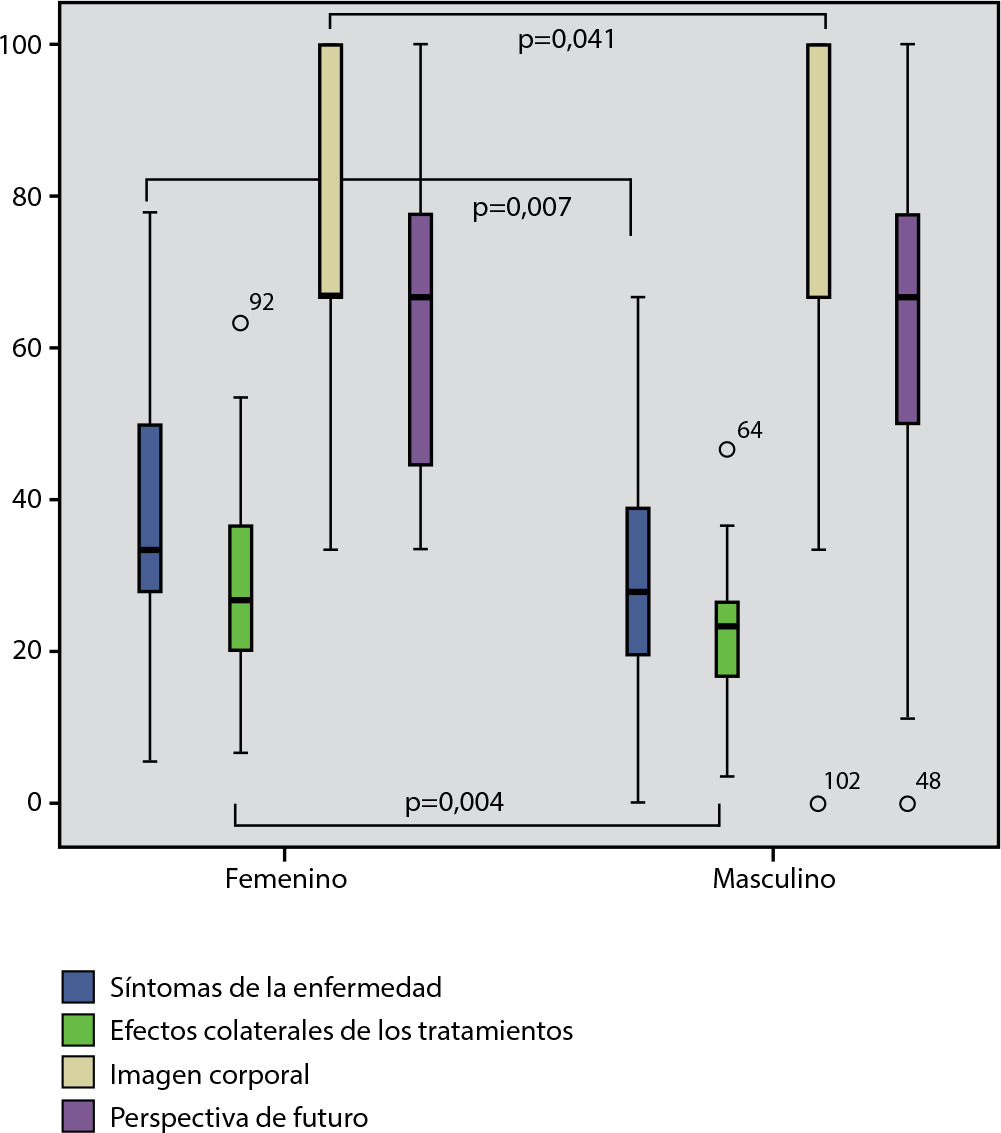
-
ORIGINAL ARTICLE05-03-2024
Psychometric properties of the Chilean version of the quality of life questionnaire for multiple myeloma
Revista Brasileira de Enfermagem. 2024;77(1):e20230100
Abstract
ORIGINAL ARTICLEPsychometric properties of the Chilean version of the quality of life questionnaire for multiple myeloma
Revista Brasileira de Enfermagem. 2024;77(1):e20230100
DOI 10.1590/0034-7167-2023-0100
Views0See moreABSTRACT
Objectives:
To evaluate the internal consistency and construct validity of the QLQ-MY20 for assessing the quality of life in multiple myeloma survivors in Chile.
Methods:
This was a cross-sectional study conducted between March 2020 and December 2022. It involved 118 individuals from two public hospitals. The QLQ-C30 and QLQ-MY20 questionnaires were used. Internal consistency was assessed using Cronbach’s alpha(α), and construct validity was evaluated through hypothesis testing (Mann-Whitney and Spearman correlation).
Results:
The average age of participants was 67.2 years (SD=9.2). Internal consistency for the complete scale was α=0.779, for the “disease symptoms” dimension α=0.671, for the “side effects of treatments” dimension α=0.538, and for the “future perspective” dimension α=0.670. Four of the five construct validity hypotheses were confirmed: women, individuals with worse performance status, those with pain, and those with worse fatigue showed more symptoms.
Conclusions:
The Chilean version of the QLQ-MY20 demonstrates adequate internal consistency and construct validity.
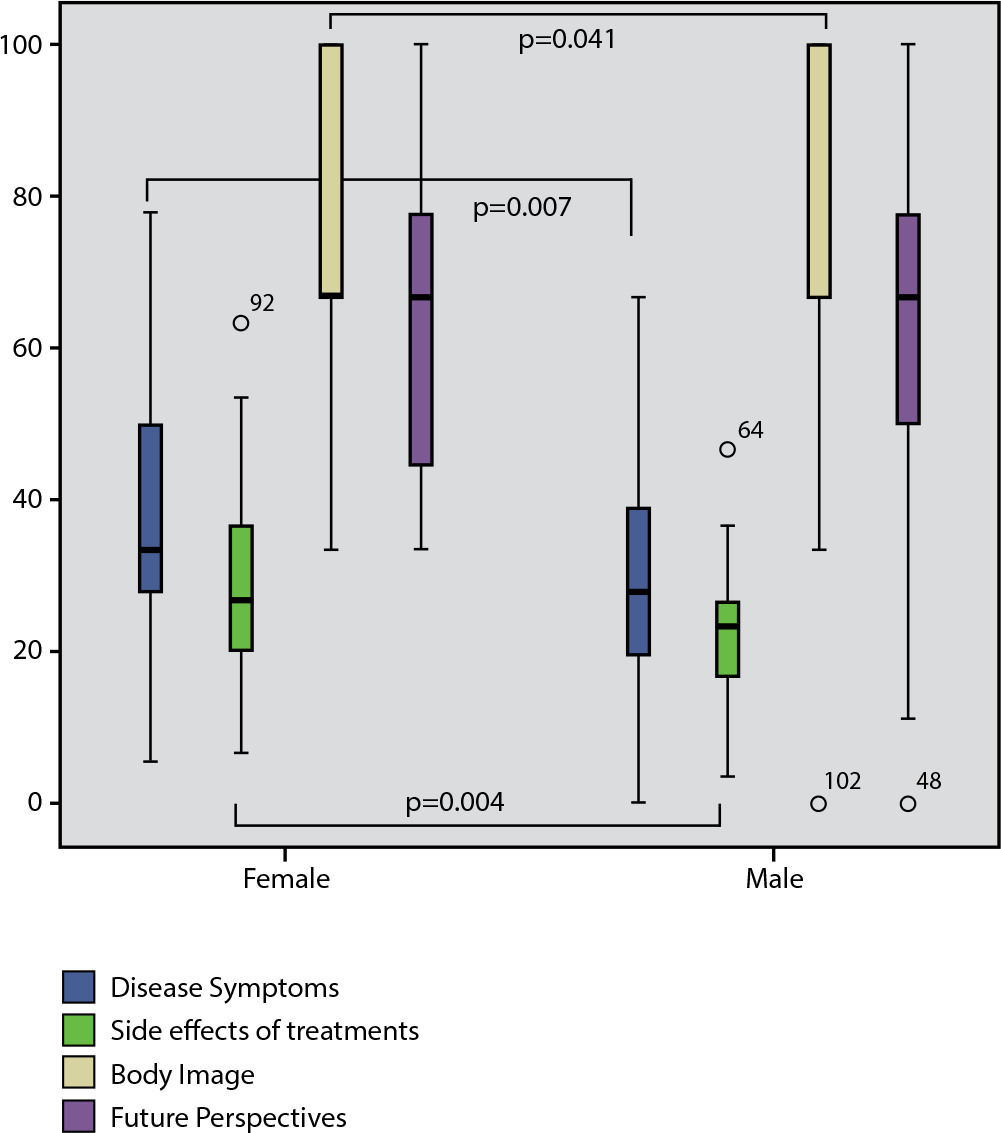
-
01-01-2016
ERRATUM
Revista Brasileira de Enfermagem. 2016;69(5):1002-1002
Abstract
ERRATUM
Revista Brasileira de Enfermagem. 2016;69(5):1002-1002
DOI 10.1590/0034-7167.20166905e01
Views0Article “Alcohol and alcoholism: attitudes of nursing students”, with number of DOI: http://dx.doi.org/10.1590/S0034-71672013000100013, published in the journal Revista Brasileira de Enfermagem, v66(1):84-9, page 89 that read:“18. Miranda SP, Vargas D. Satisfação de pacientes de um centro de atenção Psicossocial álcool e drogas com o atendimento do enfermeiro. SMAD, Rev Eletrônica Saúde Mental Alcool Drog 2019;5(2):1-15”.[…]See more -
01-01-2016
Research methodology for nursing and health: a book review
Revista Brasileira de Enfermagem. 2016;69(5):1000-1001
Abstract
Research methodology for nursing and health: a book review
Revista Brasileira de Enfermagem. 2016;69(5):1000-1001
DOI 10.1590/0034-7167-2015-0135
Views1For those interested in nursing and health, the book entitled “Research methodology for nursing and health: from theory to practice”() was released in October 2015, at the 67th Brazilian Congress of Nursing, sponsored by National ABEn. The interest emerged from two organizers: Dr. Maria Ribeiro Lacerda (UFPR) and Dr. Regina Gema Santini Costerano (UNIFRA). Forty-seven […]See more -
01-01-2016
Violence in the workplace in Nursing: consequences overview
Revista Brasileira de Enfermagem. 2016;69(5):996-999
Abstract
Violence in the workplace in Nursing: consequences overview
Revista Brasileira de Enfermagem. 2016;69(5):996-999
DOI 10.1590/0034-7167-2015-0133
Views0See moreABSTRACT
Objective:
to reflect on the consequences of workplace violence experienced by nursing professionals.
Methods:
this is a reflection paper based on recent publications related to the subject, particularly researches carried out in Brazil and in other countries.
Results:
exposure to workplace violence has been associated with health problems in nursing professionals, which may be physical damage, emotional manifestations, and psychic disorders. It also affects the employee performance, his or her family and social interactions.
Conclusion:
this phenomenon is potentially noxious and costly, for it leads to suffering, illness, absence from work, and even death. This reflection calls attention moreover to the importance of a safe and adequate health care work environment.
-
REFLECTION01-01-2016
Construcción de la enfermera de práctica avanzada en Catalunya (España)
Revista Brasileira de Enfermagem. 2016;69(5):991-995
Abstract
REFLECTIONConstrucción de la enfermera de práctica avanzada en Catalunya (España)
Revista Brasileira de Enfermagem. 2016;69(5):991-995
DOI 10.1590/0034-7167.2016690507
Views0RESUMEN
El desarrollo de la enfermera de práctica avanzada (EPA) ha supuesto un reto para las enfermeras en países como EE.UU., Canadá, Gran Bretaña y Australia, entre otros, y desde hace escasos años está siendo considerada en Catalunya y España como un sistema para desarrollar nuevos roles que aporten eficacia y eficiencia al sistema sanitario. El presente artículo pretende conceptualizar la EPA y los modelos de referencia así como contextualizar y reflexionar sobre la EPA en Catalunya, desde el punto de vista de formación y de la implantación de los denominados nuevos roles de enfermería, asimilándolos a la práctica avanzada.
Keywords:Competencia ClínicaEnfermeríaEnfermería de Práctica AvanzadaPráctica ProfesionalRol de la EnfermeraSee more -
01-01-2016
Developing the Advanced Practice Nurse in Catalonia
Revista Brasileira de Enfermagem. 2016;69(5):991-995
Abstract
Developing the Advanced Practice Nurse in Catalonia
Revista Brasileira de Enfermagem. 2016;69(5):991-995
DOI 10.1590/0034-7167.2016690507
Views0See moreABSTRACT
The development of advanced practice nurses (APN) has proved a challenge for nurses in countries such as the USA, Canada, Great Britain, and Australia among others. It is only in recent years that the system has been considered in Catalonia and Spain as a way to develop new roles to bring effectiveness and efficiency to the health system. From the standpoint of training and implementation of the above-mentioned new nursing roles, the following article aims to conceptualise APN and its reference models, as well as to contextualise and reflect on APN in Catalonia in order to assimilate them into advanced practice.
-
01-01-2016
International academic mobility in nursing education: an experience report
Revista Brasileira de Enfermagem. 2016;69(5):986-990
Abstract
International academic mobility in nursing education: an experience report
Revista Brasileira de Enfermagem. 2016;69(5):986-990
DOI 10.1590/0034-7167-2015-0128
Views0See moreABSTRACT
Objective:
report the experience of international academic mobility in Ireland through the program Science Without Borders during undergraduate education in nursing.
Method:
a report of experience presented in chronological order, with a descriptive nature.
Results:
the opportunity to know and be able to discuss questions regarding health and nursing in Ireland allowed the review of concepts and a more reflective perspective regarding nursing practices. Additionally, the exchange promoted personal strengthening regarding the confrontation and solution of problems, development of technical and scientific abilities, improvement of linguistic competences and construction of personality, independence and maturity.
Conclusion:
regarding such constructive and enriching experience that this mobility provides to students, to the governing authorities, to the population and to Brazilian nursing, sharing this experience is expected to serve as encouragement for those who search for new horizons, with the objective of adding knowledge for their personal and professional life.
-
01-01-2016
Online training for health professionals in three regions of Brazil
Revista Brasileira de Enfermagem. 2016;69(5):981-985
Abstract
Online training for health professionals in three regions of Brazil
Revista Brasileira de Enfermagem. 2016;69(5):981-985
DOI 10.1590/0034-7167.2016690506
Views0See moreABSTRACT
Objective:
to describe online training experience aimed at professionals working in the public health service in 27 Neonatal and Pediatric Intensive Care Units, and to reflect concerning the training process and possible improvements in this process.
Method:
this is an experience report study about the online training with multidisciplinary content, planned from the situational diagnosis of 27 institutions. The training target set was 10 participants per institution and per module, including the following topics: Indicators of Quality as a Management Tool, Hand Hygiene, Patient Safety, Intravenous Therapy and Patients’ Chart Record.
Results:
a total of 2,071 active students in the modules, with 1,046 approved. The mean of 76 students per module exceeded the target set.
Conclusion:
experience has shown that online training is comprehensive as a potential tool for the professional technical development and digital inclusion. The online learning system becomes weakened if participants are unaware of the technological resources.
-
01-01-2016
Technologies in intensive care: causes of adverse events and implications to nursing
Revista Brasileira de Enfermagem. 2016;69(5):972-980
Abstract
Technologies in intensive care: causes of adverse events and implications to nursing
Revista Brasileira de Enfermagem. 2016;69(5):972-980
DOI 10.1590/0034-7167.2016690505
Views0See moreABSTRACT
Objective:
to identify the causes of adverse events affecting clients resulting from the use of equipment in intensive care services; to point out the main recommendations for clinical practice to minimize these events and, then, discuss the implications to nursing care.
Method:
integrative and descriptive review on the SciELO, Medline, LILACS, and PubMed databases. Articles were selected based on the inclusion criteria and the structured instrument was applied.
Results:
altogether, 11 articles were selected where three evidence units were outstanding: Equipment failure; inadequate use of equipment; and team failure. Permanent education of professionals; evaluation of production and availability of equipment; and use of checklists are recommended.
Conclusion:
preventing adverse events related to equipment is one of the nursing responsibilities and requires the establishment of defensive barriers to prevent these.
Search
Search in:
Nuvem de Tags
Adolescente (85) Atenção Primária à Saúde (239) COVID-19 (91) Criança (91) Cuidados de Enfermagem (269) Educação em Enfermagem (151) Educação em Saúde (139) Enfermagem (930) Enfermagem Pediátrica (86) Estudantes de Enfermagem (77) Estudos de Validação (131) Família (87) Idoso (208) Promoção da Saúde (99) Qualidade de Vida (104) Saúde do Trabalhador (86) Saúde Mental (145) Saúde Pública (82) Segurança do Paciente (150) Tecnologia Educacional (100)



